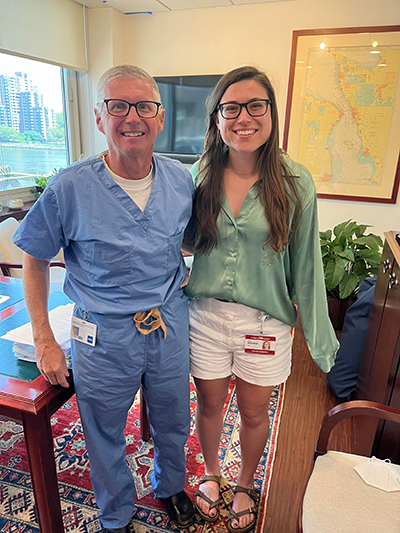CAMEO HSS Fellows Take Off
Fellowship educates exceptional trainees to excel in careers that apply engineering principles to maintain and restore musculoskeletal function.

June 16, 2023, marked the 45th anniversary of the Cornell-Hospital for Special Surgery (HSS) Program in Biomechanical Engineering, rebranded in 2020 as the Center for Advanced Materials and Engineering in Orthopaedics (CAMEO). This academic year also marked the first year of an NIH-funded ‘Combined Engineering and Orthopaedics Training Program’ T32 training grant awarded to CAMEO in 2021 for select pre-doctoral and postdoctoral fellows. The purpose of this grant is to educate, support and empower exceptional trainees to excel in careers that apply engineering principles to maintain and restore musculoskeletal function. For 18-24 months trainees work on a collaborative project between the Cornell and HSS campuses, including a semester of research at the HSS main campus in New York City.
The Meinig School was proud to announce that Ph.D. students Ana Witkowski and Lainie Eisner were selected as the inaugural pre-doctoral CAMEO fellows and worked with a team of mentors that included a Cornell faculty member and a clinical faculty member at HSS.
“My research focuses on osteoarthritis, mainly on using already FDA-approved drugs to try and find a solution for the loss of cartilage and bone changes that occur,” said Witkowski, whose research is a collaboration between Professor Marjolein van der Meulen at Cornell and Dr. Mathias Bostrom at HSS. “The fellowship allowed me to take my research that one step further than mouse work, to learn how to set up a clinical trial and execute it safely to see if women taking those same drugs have differing outcomes in their knee replacements.”
Eisner’s research is a collaboration between Cornell associate professor Nelly Andarawis-Puri and Dr. Michael Fu of HSS and seeks to understand the biological response to mechanical fatigue in tendon injury. Eisner, who chose Cornell specifically for its history of excellent orthopedic biomechanics research and relationship with HSS, hopes to become a research professor in orthopedics at an academic medical center. “Getting more experience in the academic medical environment at HSS has helped me understand how clinician-researcher collaborations work, and how patient tissue samples can be used to accelerate translation of orthopedics research.”
By all accounts CAMEO’s training program has been a success and continues to grow. This fall the program started two new pre-doctoral fellows—Quinton Wright, advised by Eve Donnelly and Dr. Emily Stein, and Benjamin Johnson advised by Dr. Scott Rodeo and Andarawis-Puri. CAMEO has secured a supplement that will support four additional Ph.D. students for one year, resumed a summer immersion term for five Meinig School students, received a supplement for investigating pain in musculoskeletal disease, initiated an HSS surgeon-scientist development program, and added five new faculty to the program. In addition, leadership will continue periodic retreats and HSS-wide meetings for continued collaboration and program development.
CAMEO and the start of the T32 training grant are the latest developments in the long, distinguished history of the Cornell-HSS program. This collaboration is well positioned to become the premiere program in orthopaedic engineering education and research in the country.

